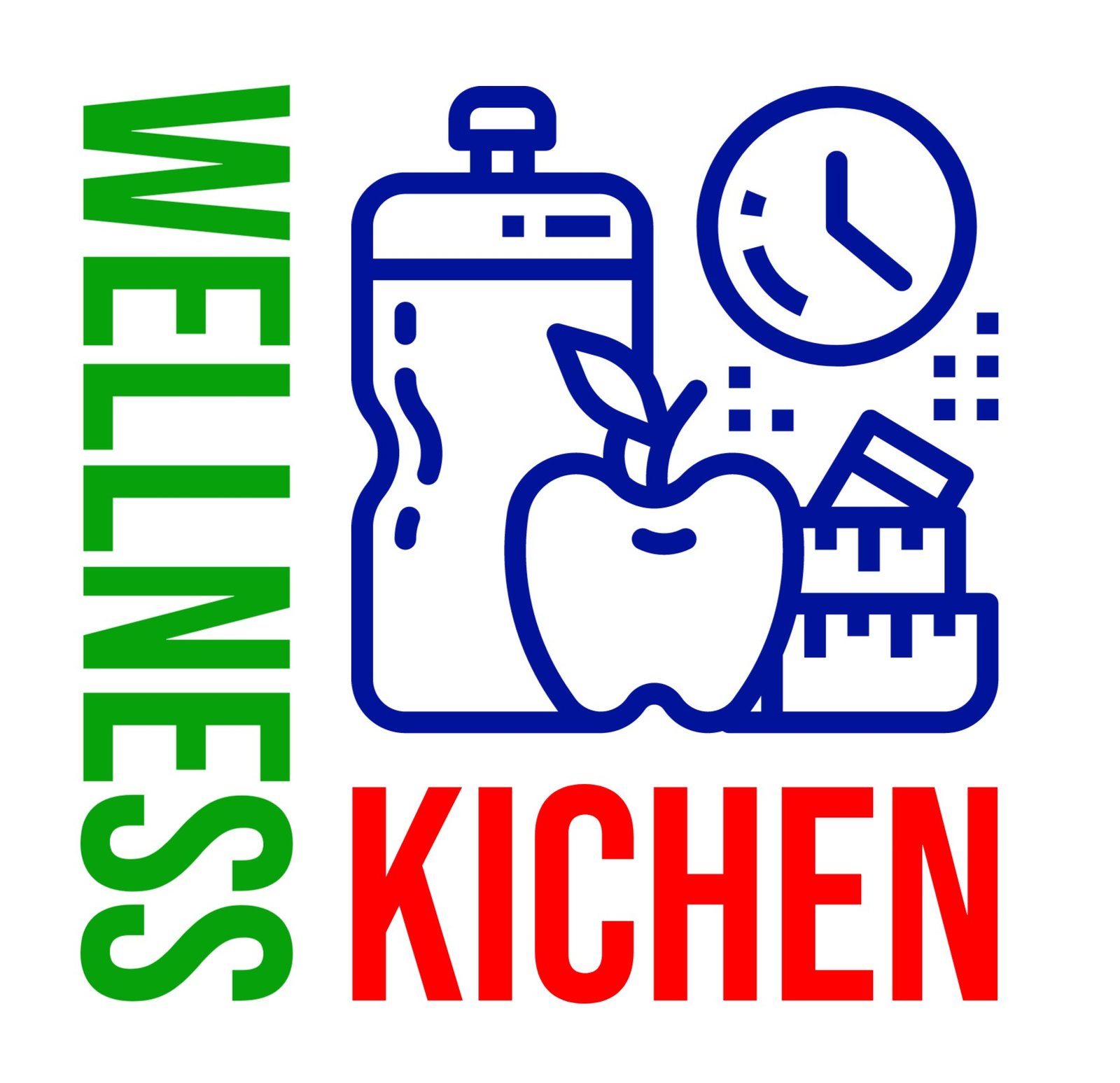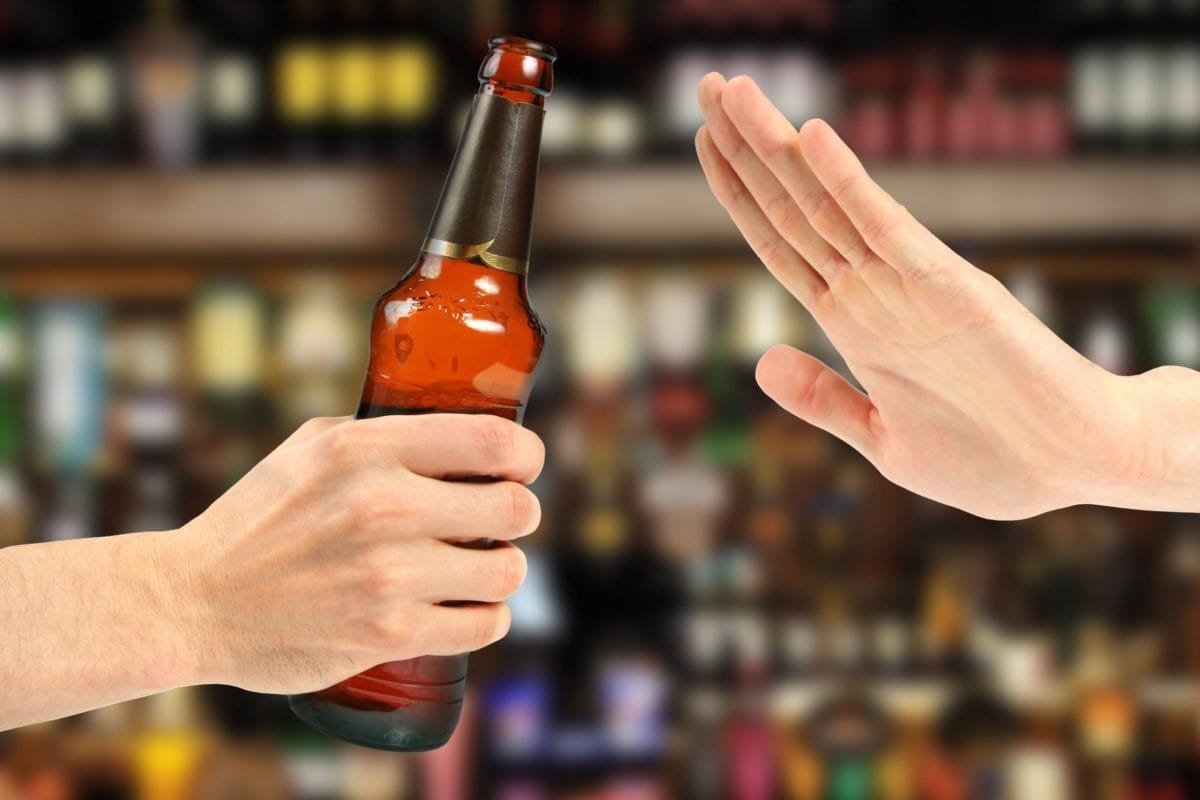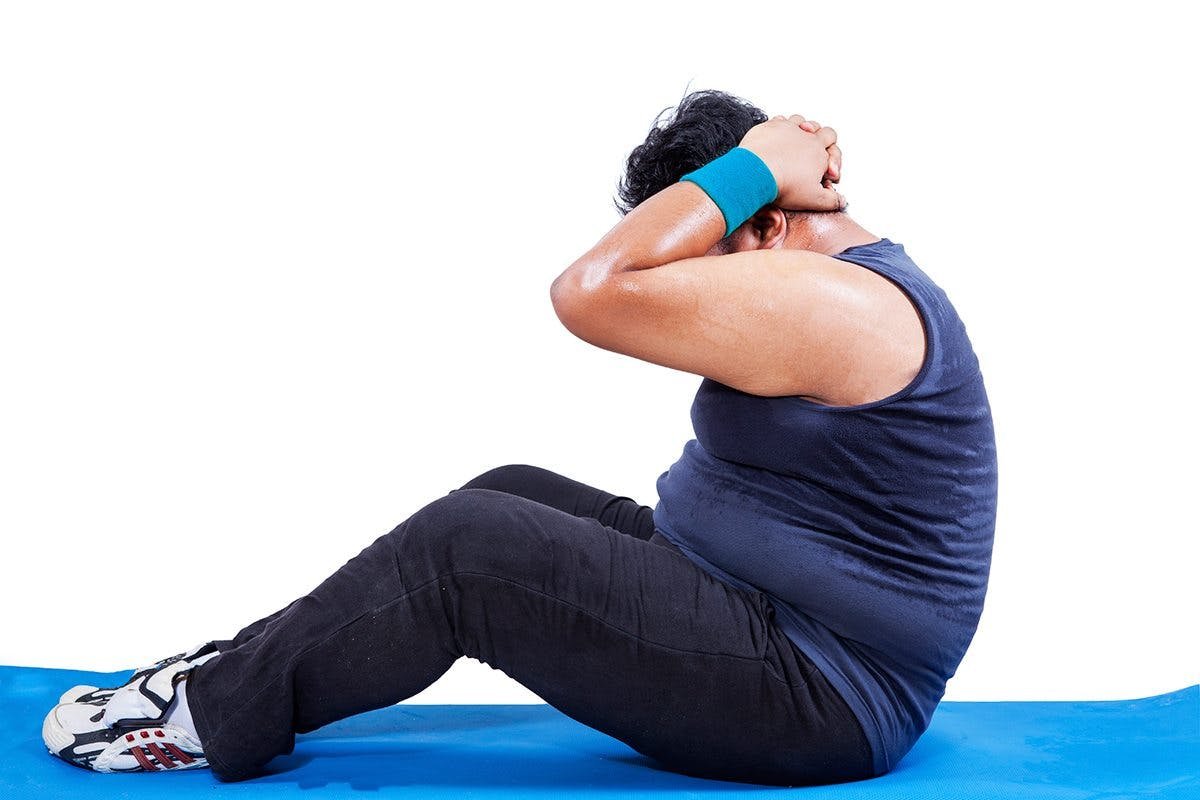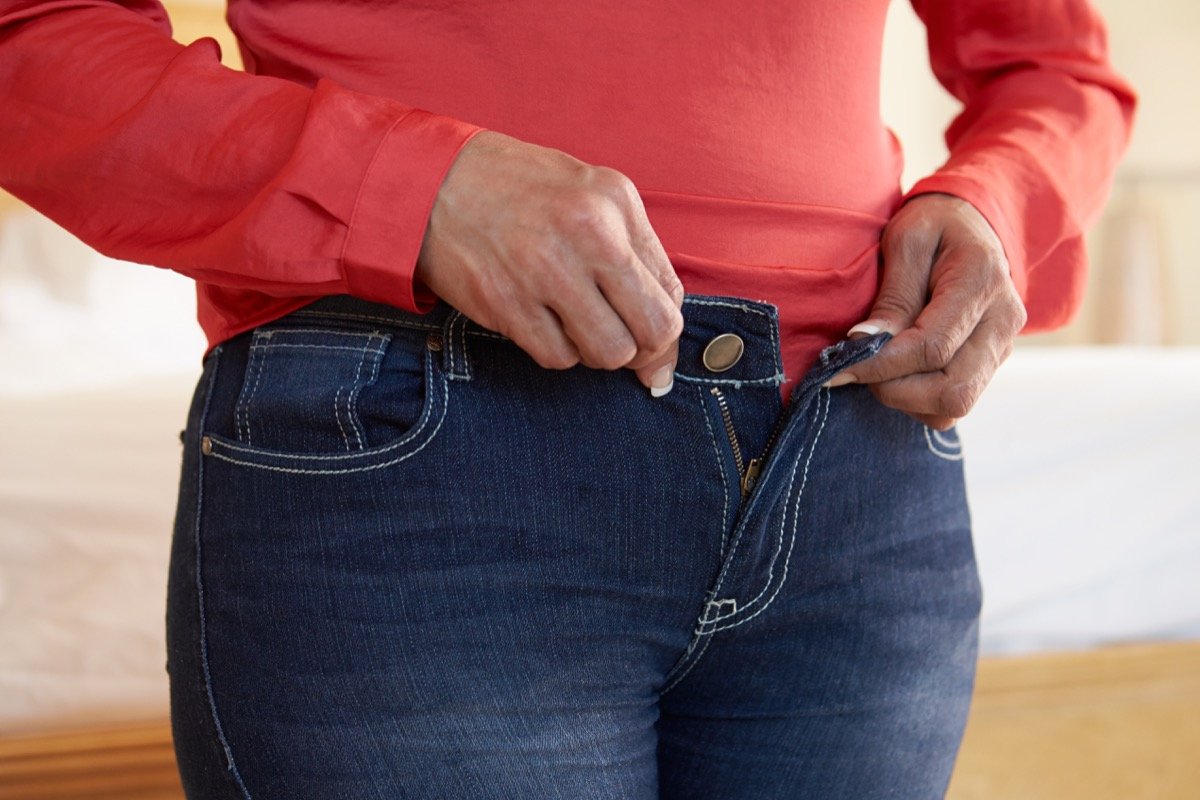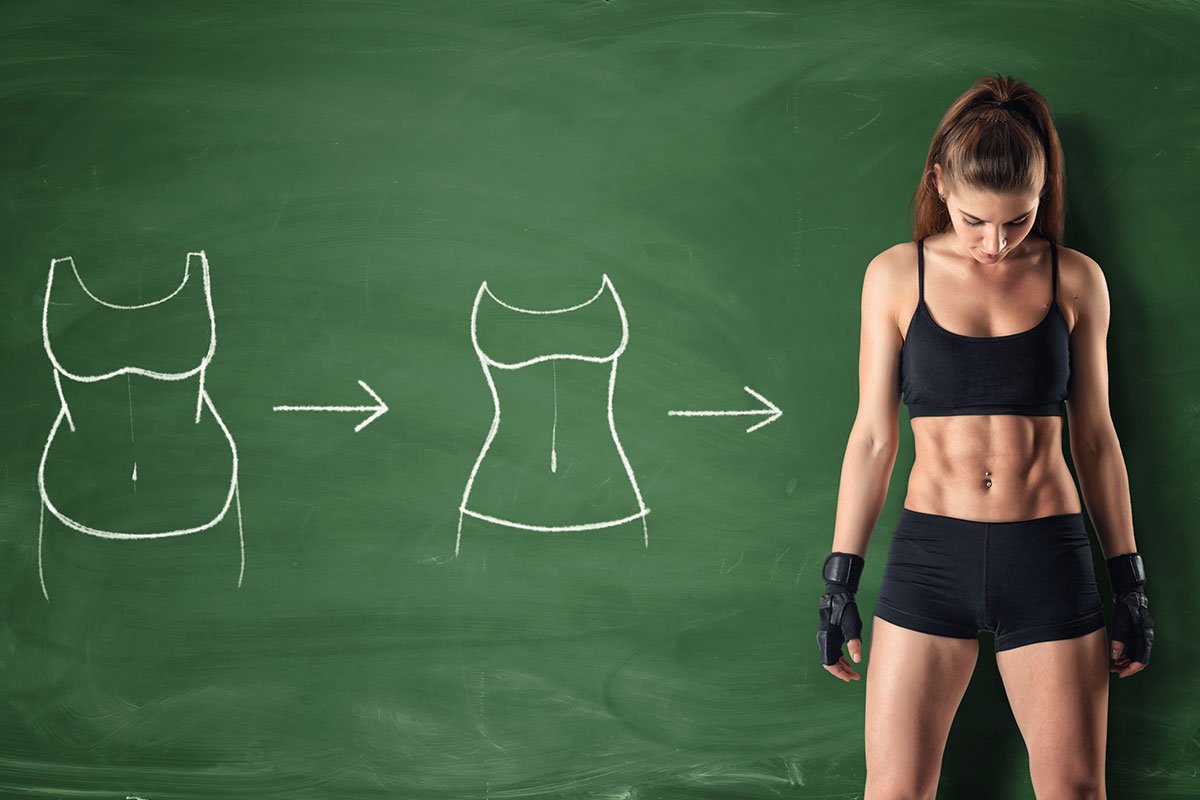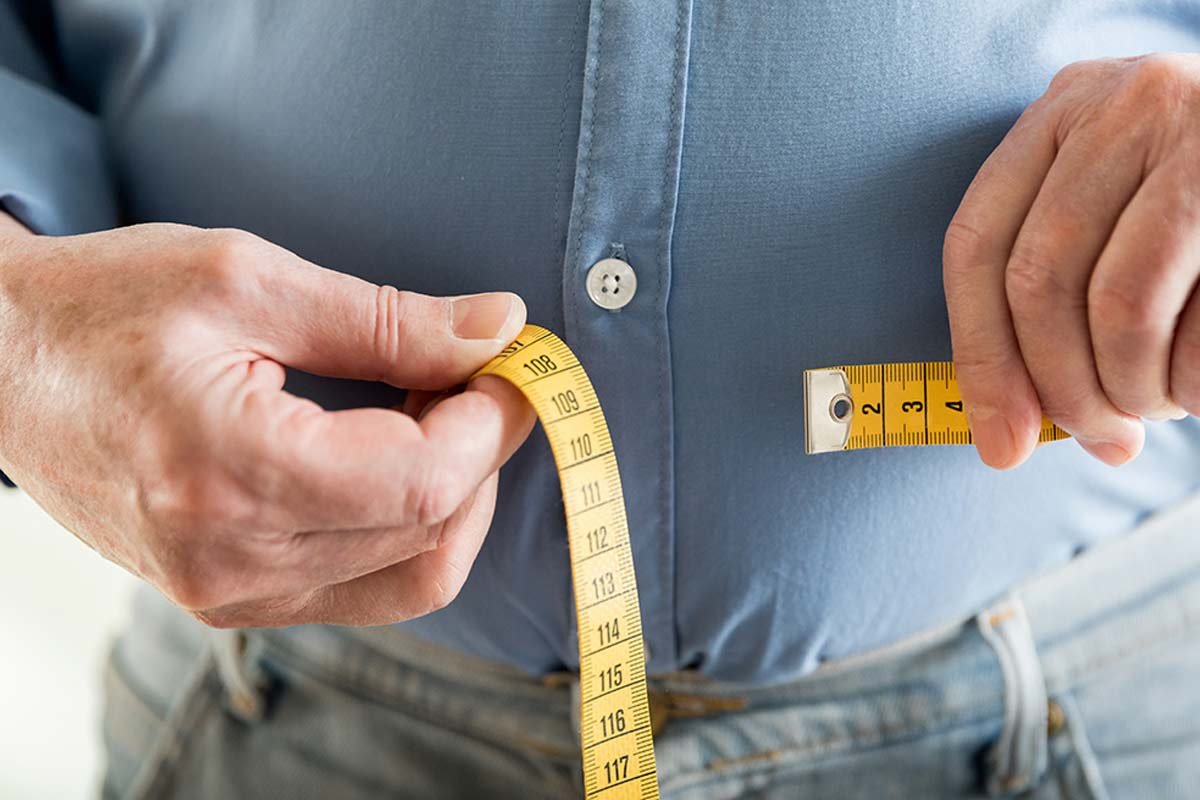Increase your chances of a slimmer you after hitting the big 4-0 with these bad habit breakers, good lifestyle routines, and healthy eating tips.
There are certain things everyone over the age of 40 should be doing to guarantee that the second half of life’s big game is as exciting as the first half. After all, once you hit 40, your body begins to lose muscle mass, the lean tissue that helps you burn fat and calories; women drop about half a pound of muscle per year after crossing 40. That’s why 40 tends to be the dividing line between those who are headed for a long, healthy lifetime of lean, and those who are headed for an early (and probably much larger) grave.
To keep you in top shape, we’ve uncovered these essential weight loss tips for playing your second half perfectly.
Ditch the Yo-Yo diets.
The cabbage soup diet? Really? Just no. Restricting calories and losing body fat too quickly can wreak havoc on insulin, leptin, ghrelin and other hormones, prompting a surge in hunger and a slump in metabolism. These effects can last for more than a year, even after the diet is abandoned,
Educate yourself before eating out.
Eating out is a treat and is probably something you’re doing because you deserve it—maybe it’s your birthday, you’re celebrating a family member, or just getting together with old friends. But letting yourself indulge doesn’t mean you have to be completely blind to just how deceptive many restaurant menu options can be.
Take your sleep really seriously.
Over the years, you’ve probably had moments where being able to get by on very little sleep was almost like a badge of honor. But as sleep medicine progresses and people are learning more about sleep health, the ties between your Zzzs and your LBs on the scale are becoming clearer. Losing just an hour of sleep each night for three days can prompt a surge in the hormone ghrelin, which stimulates appetite, and a slump in the hormone leptin, which tells us when we’re full. Deep sleep, on the other hand, fuels the production of the fat-burning human growth hormone (HGH).
Stop reusing your water bottles.
You think you’re being economical or environmentally friendly, but you’ll want to start avoiding those plastic bottles in the first place. A growing body of evidence suggests that exposure to toxins like bisphenol A (BPA), organophosphate pesticides and phthalates may be fueling weight problems. “We are starting to see a lot of human studies showing an association between the presence of chemicals and obesity. A 2011 Harvard study found that adults with the highest concentration of BPA in their urine had significantly larger waists and a 75 percent greater chance of being obese than those in the lowest quartile. Reusing plastic bottles with BPA adds to the risk because temperature changes and the gradual breakdown of the plastic will increase the rate of the release of the chemical.
Start Instagramming your food.
Speaking of social media, it’s time to take a cue from those iPhone-crazy millennials because it might just be the weight loss boost you want! Holding onto that food memory may help you eat less at breakfast…and lunch…and dinner. An analysis on a number of “attentive eating” studies printed in the American Journal of Clinical Nutrition showed that if people recall their last meal as being filling and satisfying, they tend to eat less during their next meal. Researchers found techniques like writing down or drawing meals (and even keeping food wrappers and receipts!) to be particularly beneficial.
Be pessimistic for a moment.
Picture this in your mind: You’ve dieted and worked out for the past 10 years and you’re fatter than ever. Your health is in shambles and you’re hopeless at resisting food temptation. You know better, but you look and feel unhealthy. It’s that kind of “negative fantasizing” that researchers say paradoxically provides powerful motivation for weight loss. According to a study in the journal Cognitive Therapy & Research revealed that obese women on a weight loss journey who had the most positive fantasies—showing off their new, hot bodies to friends a year later—actually lost 24 pounds fewer than those with the most negative thoughts. While it’s fun to visualize the future benefits of weight loss success, researchers say negative fantasies about weight loss mentally prepare dieters for temptation and hardship.
Go easy on the hand sanitizer.
We know, we know: It’s Corona season. But we’re sorry to say that, after our research team here dug into the science, we have some bad news for you: Your hand sanitizer could be making you fat. Triclosan is a synthetic antibacterial agent frequently added to soap. It’s referred to by researchers as an “obesogen“—a compound that can potentially cause weight gain by disrupting the body’s endocrine (hormone) system. Studies suggest that triclosan can negatively affect the thyroid. As thyroid hormones control metabolism, any hit to the organ’s functionally could cause you to gain weight. The evidence is of particular concern for hospital workers, researchers say, as they’re exposed to the antibacterial agent on a regular basis and often show significantly higher levels of triclosan in their urine. A study in the journal PLOS One found a detectable level was associated with a 0.9-point increase in body mass index (BMI). If you’re a frequent hand-washer, experts recommend sticking to good old soap—not the antibacterial kind—and to buy organic cleansers when possible.
Beware the viral Facebook videos.
You know the ones: In 30 seconds or less, you watch a mysterious pair of hands layer cookie dough with Oreos with brownie mix. Bake, cut, and oh how yummy—and insanely, ridiculously, break-the-chair fattening. “The internet and social media sites are basically making you fat. The internet has made it basically impossible to stay away from cravings and indulgences. These are not excuses to eat unhealthy food.” Next time you see one of those videos, ask yourself how you could make it healthier—and if you can’t, click out of it and never look back.
Reassess your comfort foods.
This one has a surprise twist you won’t see coming. “When you eat things to which you’re sensitive or intolerant, you get an increase of the hormones epinephrine and norepinephrine, so you literally get a high and this reaction can result in cravings for the very foods we should avoid. Food sensitivities may also lead to inflammation and water retention. To compound the problem, over-the-counter antihistamines bolster appetite and dull energy, studies show.
Get a stand-up desk.
At this point, you’ve spent around 20 or more years in the workforce. You’ve paid your dues and ran circles around your competition—resulting in your own office, possibly. So, why aren’t you owning that space like the boss you are? The first tweak for your office makeover: Invest in a height-adjustable stand-up desk. Here’s why this can be such a game-changer for your waistline: A British study found that standing at work burned 50 more calories per hour than sitting. If that doesn’t sound like a lot, consider this: If you stand for just three hours of your work day, you’ll expend more than 30,000 extra calories per year—which amounts to about 8 pounds of fat!
Do it yourself,
Remember when you were 23 years old and wouldn’t even dream of spending your coveted cash on letting someone else mow your lawn, wash your car, or paint your living room? Try tapping into that scrappy, resourceful inner you a bit more and you’ll wind up torching calories. For example, a 150-pound person will burn around 200 calories if they wash and wax their car for 40 minutes.
Make it tea, all the time.
We get it: You’ve been in a relationship with coffee longer than your spouse. But the benefits of tea are so incredible. Here’s the thing about tea: Study after study proves that tea boosts metabolism, turns on your fat-burning hormones, and help reduce stress. You can put it in smoothies or even cook with it. If you don’t know which tea to start with, go for matcha: It’s the superhero version of the already-mighty green tea.
Swap your bread.
Once upon a time, you probably thought white bread was a basic staple for the pantry. And you’ve maybe switched to wheat, which is something of an improvement—if it was still 1996. But if “enriched flour,” “high fructose corn syrup,” or “sugar” is one of the first few ingredients listed on your bread’s label, you’re not doing your waistline any favors. The trio to try for: Look for bread that comes in less than 80 calories, has less than 3 grams of sugar per slice, and lists whole grains as the first ingredient.
Stop the soda habit.
If you have one soda a day, studies show that you’re accumulating fat around your organs (visceral fat) and likely giving yourself a “soda belly”—a protruding, beer belly-like gut that’s the result of about 1.8 pounds of fat pushing out your belly. And that’s in addition to all the other harmful things we know about soda. (Diet doesn’t do you any favors.)
Drink 2 cups of water before each meal.
Drinking water is essential for all your body’s functions and it dramatically ups your odds are of staying thin. In fact, one University of Utah study found that dieters who downed two cups of water before each meal lost 30 percent more weight than their counterparts who didn’t sip any H20 before noshing. If you don’t have a water cooler at your office, fill a BPA-free bottle with water at home. If you drink two cups before breakfast, lunch, and dinner, that just leaves you with two more cups before you meet your minimum recommendation for the day. So easy!
Let legumes take charge.
According to a review published in the journal Obesity, legumes—including beans, chickpeas, lentils and peas—could keep you from the snack drawer until dinner. Researchers found that subjects who consumed between ¾ and 1 cup of legumes daily felt as much as 31 percent fuller than those who didn’t! But there’s a catch: Although participants felt fuller when they ate legumes, they didn’t always eat less throughout the day. It’s still up to you to tune out the call of cravings—a completely different beast than hunger. But when it comes to willpower boosters, beans are a great way to get a jumpstart.
Don’t drink so many calories.
That zero-calorie diet soda is its own death sentence. But as for that cream-and-sugar coffee every morning? That’s 80 extra calories, and that’s if you’re ordering normal coffee and not one of those tricked-out frappa-cappa-whipped-something drinks from your favorite coffee shop that have a couple hundred calories. Many fruit juices, energy drinks, and even big-chain smoothies are loaded with calories.
Walk more.
There’s a host of benefits that come with walking more, from stress relief to stronger leg muscles. But the simple act can ward off weight gain simply because you expend more calories than taking the elevator or parking as close as possible to the door. But for weight loss and to actually start burning, you’ll need to walk 3 mph, which is as if your plane is about to start boarding and you are still walking toward your gate. And while they don’t have to all be 3 mph steps, the average recommendation is 10,000 steps a day.
Sit less.
Sitting is the new smoking. Researchers from Toronto recently showed that sedentary behavior can lead to death from cardiovascular issues and cancer, as well as cause chronic conditions such as Type 2 diabetes. Prolonged sitting, meaning sitting for 8-12 (or more) hours per day, increased your risk of developing type 2 diabetes by 90 percent. And weight gain. So. much. weight gain. Be mindful of not plopping down on the couch all evening and if you can swap times you sit at work for standing. Have you heard of stand-ups? They’re meetings where everyone stands and many people love them because these meetings often wind up shorter than other meetings where people get too cozy at that conference table!
Slip in other ways to be active.
Whether it’s playing with your dog, carrying the stroller for your family members with little ones, or exploring a nature path, it’s crucial to fit in extra activity when you can. “Metabolism and hormonal changes in your 40s create an ideal environment for excess fat storage in women—especially in the midsection, In your 40s, activity is essential.”
Boost metabolism with micro workouts.
That mom of three who also teaches spin class and always looks fantastic? Awesome. But that’s not attainable for everyone, which can leave you feeling frustrated that you can’t be a workout god or goddess, too. The good news: You only need 2 ½ minutes to boost your metabolism and start burning calories, too. Research printed in the journal Physiological Reports showed that people who did five 30-second bursts of max-effort cycling, followed by 4 minutes of rest, burned 200 extra calories that day and boosted their metabolism for the next 24-48 hours. It’s highly unlikely you have a stationary bike handy at your place of work, but a similar result could be achieved by running up the stairs and doing jumping jacks.
Let your body fast.
One idea that seemed more attainable for someone over 40 is from a wellness expert, who said try eating only between the hours of 9 a.m. and 6:30 p.m. (Can you imagine a college guy or a new mom abiding by that rule?!) As long as you are still getting enough calories to keep your metabolism up, this tactic can help you lose weight because it puts your body into a fasted state, which Expert says can make the process easier and faster.
Embrace seaweed.
It can get overwhelming to keep up with all the superfoods out there, we know. But if there’s one amazing food you should be getting more of (and that we know you’re not), it’s seaweed. The sea plant is a great source of iodine and you can enjoy seaweed in sushi, broth-based soups, as chips or snacks, and more. “Without sufficient levels of iodine, your thyroid function becomes impaired and it’s harder for your body to burn fat,” says nutritionist who suggests sneaking sea vegetables into your diet at least three times a week. Seaweed also contains a compound called alginate, which has been shown to significantly cut fat absorption.
Learn about ‘eating clean.’
You’ve heard this buzzy phrase a bunch of times by now, right? It’s way more mainstream than you may realize, though—and much more attainable than you think. The basic rule of eating clean—and, forgive us for watering it down—is to eat more real food and less fake food. Doritos are not food. Those sketchy frozen enchiladas by Big Store Name Brand are often not much better. And that cream of something soup you mix into every chicken dish is a way of life that’s making your waistline expand.
Stop doing sit-ups.
Not only is this antiquated exercise less effective than something like a front plank, sit-ups are terrible for your spine and can cause herniated discs. Fact: A traditional sit-up puts around 3,350 newtons of compressive force on the spine, but the U.S. National Institute for Occupational Safety and Health states says anything above 3,300 newtons is unsafe. We have created an entire workout plan to give you a rock-hard core and it doesn’t involve one single sit-up.
Try meditation.
The older, wiser, less-bendy sister of yoga, meditation is an amazing activity that people can reap major rewards from. Studies show that people who regularly practice mindfulness meditation have more activity in their left prefrontal cortexes, which makes you calm and happy. Plus, a 2014 study found that individuals who meditate are less likely to overeat or give in to emotional eating. To get started, unroll a yoga mat or sit on a carpet in a sunny room (east-facing if possible) and take five uninterrupted minutes thinking about something that you’re grateful for. You’re supposed to lose a few LBs, but even if you don’t, we guarantee you’ll still be glad you made meditation part of your life.
Live by the half-plate rule.
Nope, the rule isn’t to only eat half of what’s on your plate. It’s that half of your plate should always be made up of veggies. This rule is most effective when you eat all the veggies, first. You’ll feel fuller faster, longer, and be less likely to go for seconds. As always, don’t fret about cleaning your plate or wasting food; it will go to waste whether you eat it or not!
Eat less salt.
High amounts of sodium can lead to belly bloating and there’s a good chance you are already getting more sodium than you need. To cut back on salt intake, to eat fewer processed foods like bread, pizza, and condiments. “Read the Nutrition Facts label to find how much sodium is in each serving. “Very Low Sodium is 35 milligrams or less per serving; Low-Sodium is 140 milligrams or less per serving; Reduced (or less) sodium is at least 25 percent less sodium per serving than the usual sodium level.”
Don’t fear the fat.
Sometimes, you have to eat fat to lose fat. Specifically, healthy fats—those with omega-3 fatty acids, monounsaturated fats, and oleic acid—dramatically help to satisfy hunger and fire up your metabolism. Think avocados, walnuts, coconut oil, and even full-fat dairy.
Use your non-dominant hand.
Remember when you were little and would try to write with different hands? Eventually, a long time ago, you probably gave up on that. But personal trainer to the stars Jay Cardiello says it can be a great weight loss trick. “It takes 15 minutes for your brain to realize that you’re full,” he explains. “To give your mind time to catch up to your mouth, simply switch your fork to non-dominate hand. It may be frustrating, but it’s a simple and unnoticeable way to curb overeating and lose weight.”
Cut back on wine and booze.
You deserve that glass of Scotch or wine, we know. But the unfortunate truth is that your body doesn’t metabolize alcohol as efficiently as you age. So, not only are you going to add on (or not be able to lose) weight because of alcohol, you also wind up looking older and sleeping worse. “[As you age] it will be increasingly difficult to get a good night’s rest with alcohol in your system and sleepless nights lead to carb and sugar cravings the next day,” says Nutritionists. Meanwhile, alcohol zaps moisture from your skin making fine lines more noticeable and speeding up your skin’s loss of elasticity.
Be your own therapist.
In an Orlando Health survey of more than a thousand respondents, only 10 percent of people listed their psychological well-being as part of their weight loss journey. The problem? Not being in tune with your emotions and their connection to food is why nearly 66 percent of people gain weight back after losing it. “Most people focus almost entirely on the physical aspects of weight loss, like diet and exercise, But there is an emotional component to food that the vast majority of people simply overlook and it can quickly sabotage their efforts.” To stop emotional eating and unlock the door to weight loss success, try keeping a journal that tracks your food choices and current mood. Then look for healthy and unhealthy patterns, which can help you identify the specific life and emotional connections you have with food.
Eat for health, not weight loss.
“To see real results, you need to eat real food,” says our Trainer. “When you’re eating habits consist of eating a variety of real foods that provide the body with nourishment, a healthier body is created. And the healthier you are, the faster you’ll recover post-workout and the better chance you’ll have at losing fat and building muscle.” Plus, eating for health instead of weight loss means you’ll develop a habit that makes smarter food choices easier and easier.
Buy organic.
By now, you should know that weight and health problems are often the result of an accumulation from what you’re consuming. With that in mind, take a moment to think about how you’ve had at least four decades to accumulate toxins from food and drink—some seriously bad stuff that can lead to obesity. Many of those come from pesticides and hormones in your meat and produce. So start choosing organic fruits and vegetables and hormone-free meat.
Always be prepared with snacks.
Remember the Boy Scout motto about always being prepared? At 40 or older, you most likely have more things demanding your time and attention than ever before. To make it easier to eat lower calories and avoid stuffing your face when you’re starving, always keep your desk, pantry, car, and purse stashed with healthy snacks. Raw almonds and bananas are two of the easiest, but you can get more ideas with these healthy snack ideas. And whatever you do, do not hit up any vending machines!
Turn off the tube.
Studies show that lean people watch less television, plain and simple. A recent analysis of multiple studies found that for every two hours spent watching TV, the risk of developing diabetes, heart disease, and/or early death increased by 20, 15 and 13 percent, respectively. Because you’re expending less energy as you zone out in front of the telly, there’s a surplus blood sugar flooding your bloodstream and contributing to weight-related risks that crop up in your 40s and beyond. Even knitting like will keep you younger than just sitting and watching show after show!
Go swimming.
Many people stop working out or become less active as they age because they’ve started experiencing more joint pain or discomfort from old injuries. This is why swimming can be a great solution. It’s low-impact, builds endurance, and burns calories. Dive in!
Go Greek.
The benefits of Greek yogurt are far and wide while making your figure tighter and slimmer. High-quality Greek yogurt is low in calories (less than 100 for 6 oz.), has a very high amount of protein (20 grams), and provides your gut with some much-needed probiotics. Flavored, non-Greek yogurts, on the other hand, are often packed with additives that harm your health and can even make you hungrier. If you’re not a Greek yogurt fan, do know that it can be an acquired taste—but mixing in some berries, walnuts, or homemade granola might just become your new, belly busting addiction!
Adopt a weight-loss mantra.
There’s a lot of advice out there, but having a go-to mantra that gives you strength can be a powerful weapon in your weight loss arsenal. “There will always be another meal” is just one of the Weight Loss Mantras which explains that they came up with it because people all too often eat as if they’ll never have their favorite foods again. Find your mantra and make it work for you!
